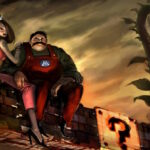 Ashe Barker, over at the YouTube Channel Guerilla Miniatures Games, has been running down a long series of thoughts on GrimDark Media. It’s a fun series – one of those hangout and gab sessions with a couple of ersatz friends who share many of the same interests as you. Both Ashe and his frequent co-host Jay are knowledgeable and engaging hosts, and have given me a new appreciation for a style of art and narrative that I’ve long dismissed as empty nihilism. There are two aspects that deserve greater attention, one they have touched on and one they have ignored.
Ashe Barker, over at the YouTube Channel Guerilla Miniatures Games, has been running down a long series of thoughts on GrimDark Media. It’s a fun series – one of those hangout and gab sessions with a couple of ersatz friends who share many of the same interests as you. Both Ashe and his frequent co-host Jay are knowledgeable and engaging hosts, and have given me a new appreciation for a style of art and narrative that I’ve long dismissed as empty nihilism. There are two aspects that deserve greater attention, one they have touched on and one they have ignored.
Before we get into them, let’s bring everyone up to speed. If you need a refresher, you can hit InfoGalactic, but I’ve got the highlight for you here:
[Grimdark is] a subgenre or a way to describe the tone, style or setting of speculative fiction…that is, depending on the definition used, markedly dystopian or amoral, or particularly violent or realistic. The word was inspired by the tagline of the tabletop strategy game Warhammer 40,000: “In the grim darkness of the far future, there is only war.”
The first aspect that my ersatz friends have touched lightly upon is the mercantile motive to base one’s IP on a static and conflict-filled setting. In the case of Games Workshop, they are selling a wargame, and it behooves them to craft a setting in which the default setting is war. Everyone hates everyone all the time and they fight over everything all the time guarantees that your little toy soldiers always have a reason to fight, even if the fight is reason enough itself. (As is the case for both the ravenous bug aliens and the genetically crafted mushroom-men warrior race.) The same situation applies even for more narrative games like D&D where, regardless of what edition or setting you use, the game is built on an underlying foundation of a cosmic war between the forces of Law and Chaos. That baked-in conflict informs everything you do, and the eternal and unending struggle means never having to say you’re sorry for piling more conflict on the situation.
Which, come to think of it, perfectly reflects our God given universe.
And that’s the second aspect of grimdark analysis that very few people want to touch. That God has given us this wonderful arena, a fallen world securely in the hands of the Adversary, is an incredible gift. We are assured, just as our little avatars on the table and on screen and in pages, of plenty of opportunities to earn our place in the heavenly choir. We are all of us God’s special forces, dropped deep behind enemy lines, commanded to push back against the relentless powers and principalities and hold back the night for just a little longer. And in this way grimdark media may just be the most honest depiction of our existence there is. But not if it omits the most important part of the tale, and every secular depiction of the dark and grim universe in which we wrestle leaves out the most important part of the tale.
Fortunately, Professor Tolkien does not.
If you close the book on your existence before the last chapter, you lose out on the best part of the tale. The lonesome valley that we all must walk by ourselves leads to an ultimate triumph, bight shores and choirs of angels and saints, and the little victories, and the darker the night the brighter the dawn. The harder the fight, the greater the reward. Unfortunately for us, most clown world media ignores the deeper magic that powers our hope. For most grimdark works, the reward for misery is a few more moments of misery. Which is no reward at all. Most grimdark media looks backward at where we’ve come in the long defeat, with no eye toward where we are heading. Certainly we are heading toward an earthly death, and our struggle may be in service of an earthly defeat, but we never strive in vain, not while we serve the Father of all Hope.
And so I’ve come to appreciate how grimdark media such as The Thing or Rangers of Shadowdeep remind us that our struggles are not in vain. Hope always remains while we yet draw breath. And when we do not, the race has ended and hope gives way to certainty. Regardless of what the authors and analysts may believe, we always have hope, even in the worst of our trials.
Blessed is the man who remains steadfast under trial, for when he has stood the test he will receive the crown of life, which God has promised to those who love him.
– James 1:12


In light of you rehashing 1:1 time on YouTube, here is a link to my world calendar.
https://drive.google.com/file/d/1n3QC_irXeYiD_q5_cf7l1ZoY331t3LIP/view?usp=drivesdk
Amen
Pretty complicated calendar, but it will sure make for a memorable campaign. Doe you find it appreciably slows play to regularly reference this in-session?